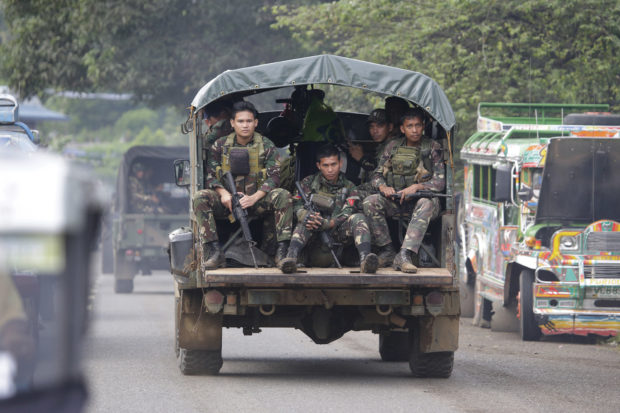
AP Photo
US Special Forces are providing crucial battlefield information to Filipino military commanders directing the fight against terrorists in Marawi City, a military spokesperson said on Wednesday.
“There are some US personnel who are operating equipment to provide information on situation awareness to our troops,” Brig. Gen. Restituto Padilla, spokesperson of the Armed Forces of the Philippines, told reporters.
“I do not know the exact number and the specific mission. They are allowed to carry rifles for self-defense. But they are not allowed to fight. They only provide support,” Padilla said.
No boots on the ground
The AFP had previously said the United States was providing technical assistance to end the occupation of parts of Marawi by terrorists allied to the Islamic State (IS) jihadist group in the Middle East, but it had no boots on the ground.
It was not clear how close to the battle zone the US troops were.
“This is what you need to understand. In a battle or a place of battle, the most important thing for a commander is to know what is happening in the entire area. That is called ‘situational awareness,’” Padilla said.
“The assistance that (the Americans) are giving is about that,” he added.
Padilla said the US troops were helping the military’s Western Mindanao Command (Westmincom) in fighting Abu Sayyaf bandits before they were transferred to Marawi to help fight Maute terrorists.
The US military used to run its Joint Special Operations Task Force-Philippines in Zamboanga City to provide training and technical assistance to Filipino troops fighting Abu Sayyaf bandits.
The task force was deactivated in February 2015 after a bungled police counterterrorism operation in Mamasapano, Maguindanao province, that cost the lives of 44 US-trained police commandos, but a small number of US Special Forces remained to help in the fight against the bandits.
Same command
“The Western Mindanao Command is just one command and the Americans were there to help go after the Abu Sayyaf but they were focused on Jolo, Tawi-Tawi, Basilan and nearby areas,” Padilla said.
“Now that there’s fighting in Marawi, that capacity was just transferred to help ground commanders in Marawi,” he added.
Padilla noted that Marawi was also under Westmincom’s jurisdiction.
“So, they’re still supporting the same commander so it was not complicated,” he added.
Padilla said the number of US troops in Marawi was “very small.”
“It’s just those who are helping operate the machine and those who maintain it,” he said.
Padilla did not name the equipment, but said the AFP still did not have the capability similar to the technical assistance provided by the US Special Forces.
“The point here is we don’t have that capability. We are now in the process of obtaining such a capability. We are now trying to buy those machines that will give us that capacity,” he said.
US drone crashed
A US official in Washington, speaking on condition of anonymity, said the United States was providing a P-3 surveillance plane as well as intelligence gathering from a drone.
That drone, however, crashed on Saturday after it lost communication links with its operator, the official said.
Padilla said the United States was providing assistance through the Mutual Defense Board-Security Engagement Board (MDB-SEB), which was created under the 1951 Mutual Defense Treaty.
“This is the mechanism where we had exchanges and requests were made,” he added.
Gen. Eduardo Año, the AFP chief of staff, heads the MDB-SEB with a counterpart four-star general from the US Pacific Command.
When asked about pictures on social media showing Caucasian men in civilian clothes carrying rifles in Marawi, Padilla said: “They also need to protect themselves.”
“They are not involved in the actual fighting but if (Maute terrorists) are able to breach our defenses and slip in, they also need to protect themselves so we allowed them to [carry firearms],” Padilla said.
“So, it’s only up to that. They are not involved in the fighting. They are just helping in providing (battlefield) information to our troops,” he added.
When asked about President Duterte’s statement that he was not aware of the Americans’ involvement, Padilla said: “I don’t know but all information from us below are given to those at the top so that these could be distributed to our leaders.”
Adm. Scott Swift, commander of the US Pacific Fleet, was in the Philippines for a four-day visit that ended on Wednesday. —WITH REPORTS FROM DONA Z. PAZZIBUGAN AND REUTERS
RELATED VIDEO

